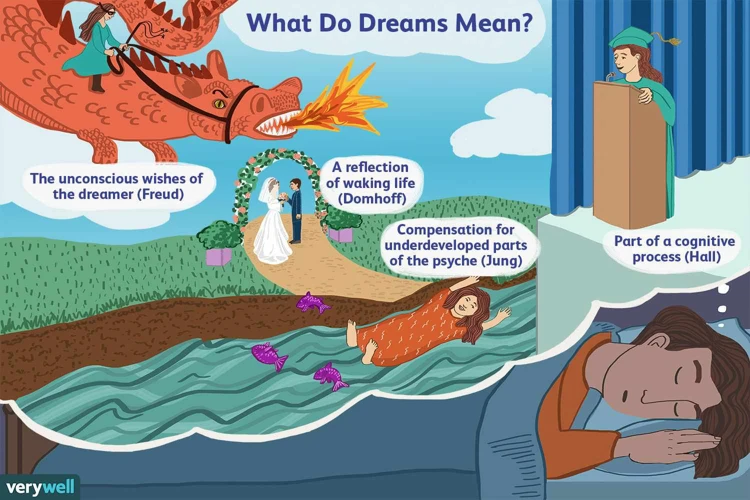We embark on a mysterious journey every night as we close our eyes and drift into the realm of dreams. These enigmatic visions hold a wealth of hidden meanings and messages, waiting to be deciphered. Have you ever pondered the science behind dreams or wondered why certain symbols appear in your nocturnal adventures? If so, you have come to the right place. In this comprehensive guide, we will delve deep into the labyrinthine world of dreams and unlock their secrets. From understanding the purpose and stages of dreams to interpreting dream symbols and exploring different types of dreams, we will unravel the mysteries that lie within the domain of the subconscious mind. Get ready to awaken your curiosity and embark on a quest to uncover the hidden meanings of your dreams.
The Science Behind Dreams

The study of dreams is multifaceted and complex, blending elements of neuroscience, psychology, and spirituality. Scientists have long been intrigued by the purpose and function of dreams, and numerous theories have been proposed to explain their significance. One prevailing theory suggests that dreams serve as a way for the brain to process and consolidate information from waking experiences, aiding in memory formation and emotional regulation. Additionally, dreams may provide a platform for problem-solving and creativity, allowing the mind to explore new possibilities and perspectives. Dreams predominantly occur during the rapid eye movement (REM) stage of sleep, characterized by heightened brain activity, vivid imagery, and the paralysis of voluntary muscles. This stage is crucial for cognitive development and learning. As we delve deeper into the hidden meanings of dreams, it becomes clear that they offer a fascinating glimpse into the inner workings of the human mind.
The Purpose and Function of Dreams
Understanding the purpose and function of dreams is a subject that has perplexed researchers for centuries. While there is no definitive answer, various theories have emerged to shed light on this intriguing phenomenon. One prominent theory suggests that dreams serve as a means of emotional processing and psychological growth. Through dreams, we may process and confront unresolved emotions, fears, and desires that we may not be consciously aware of. Dreams provide a safe space for exploring and working through unresolved issues, allowing us to gain insights and potentially find resolutions. Additionally, dreams may facilitate memory consolidation, helping to reinforce important knowledge and experiences from our waking lives. Some cultural and spiritual beliefs suggest that dreams can act as a connection to the divine or the spiritual realm, offering guidance and messages. Regardless of the specific purpose, dreams hold great significance in our lives, offering a window into the depths of our subconscious mind and the mysteries of our inner world.
Stages of Sleep and Dreaming
Understanding the stages of sleep and dreaming is vital to comprehending the intricacies of our dream experiences. Sleep is composed of several distinct stages, each with its own unique characteristics and patterns of brain activity. The sleep cycle typically begins with a period of light sleep, followed by deeper stages of sleep, and culminates in the rapid eye movement (REM) stage. During REM sleep, our brains become highly active, resembling wakefulness. This stage is closely associated with intense dreaming and vivid imagery. Interestingly, it is during REM sleep that our muscles are temporarily paralyzed, likely as a protective mechanism to prevent us from acting out our dreams. It is within these REM dreams that we often encounter surreal scenarios, unfamiliar places, and dynamic characters that might hold symbolic meaning in our waking lives. The intricate dance between the different stages of sleep and dreaming forms the foundation for uncovering the hidden messages and symbols within our dreams.
Interpreting Dream Symbols

Interpreting dream symbols is a key aspect of unlocking the hidden meanings behind our nocturnal adventures. Dreams are often filled with vivid and sometimes bizarre imagery that can be puzzling to decipher. Common dream symbols, such as water representing emotions or flying symbolizing freedom, have been widely explored and documented. However, it’s crucial to remember that dream symbolism can also be highly personal and subjective. The role of archetypes in dream analysis adds another layer of depth to the interpretation process. These universal symbols and patterns evoke profound emotions and tap into the collective unconscious. In addition to universal symbolism, dreams may also contain personal symbolism that is unique to the individual dreamer. This can arise from specific life experiences, relationships, or cultural background. By paying attention to recurring symbols and considering their personal significance, one can unravel the hidden messages embedded within their dreams. Whether it’s a dream of a sloth, a spider with spiritual meaning, or a dream about a sister, each symbol carries its own significance in the context of an individual’s life. It is the careful exploration and understanding of these symbols that allows us to gain deeper insights into our subconscious minds.
Common Dream Symbols and their Interpretations
Dreams are often filled with vivid and symbolic representations, with each symbol holding a unique significance. While the interpretation of dream symbols can vary based on personal experiences and cultural influences, some common symbols have widely accepted interpretations. For instance, dreaming about a snake can symbolize transformation, healing, or even hidden fears and anxieties. Water is often associated with emotions and represents the subconscious mind. Dreams about flying can represent a sense of freedom or escapism. The interpretation of dream symbols can be subjective, and it is important to consider the context and personal associations when deciphering their meanings. By exploring the symbolism within our dreams, we can gain valuable insights into our subconscious thoughts and emotions. So the next time you dream of a spider, be sure to delve into its spiritual and symbolic meaning and unlock the hidden messages from your unconscious mind.
The Role of Archetypes in Dream Analysis
In the realm of dream analysis, archetypes play a significant role in unraveling the hidden meanings of our dreams. Archetypes are universal symbols and patterns that are deeply ingrained in the collective unconscious, as proposed by renowned psychologist Carl Jung. These symbols, such as the hero, the trickster, or the mother figure, have a transcultural and transhistorical significance. When they appear in dreams, they often represent powerful and recurring themes in our lives. By recognizing and interpreting these archetypal symbols in our dreams, we can gain valuable insights into our subconscious desires, fears, and motivations. For example, encountering a sloth in your dream might symbolize a need for rest and relaxation, while dreaming about a sister could signify the importance of familial bonds or feminine qualities. Analyzing archetypes is like deciphering a visual language that enables us to tap into the deep reservoirs of the unconscious mind. Understanding these archetypes offers us a window into the hidden aspects of ourselves and can facilitate personal growth and self-discovery.
Unlocking Hidden Meanings: Personal Symbolism in Dreams
Dreams are often filled with rich symbolism that can hold personal meaning for each individual. While there are common dream symbols that have general interpretations, such as water representing emotions or flying symbolizing freedom, it is crucial to recognize the significance of personal symbolism in dreams. Personal symbols can be unique to each person based on their experiences, beliefs, and associations. For example, dreaming of a sloth may hold a particular meaning for someone who has a deep connection with nature and values taking things slow and steady (/dream-of-sloth/). Similarly, dreaming about a sister may evoke specific emotions and memories that are unique to the dreamer (/dream-about-sister/). Understanding personal symbolism involves introspection and examining the emotions and memories associated with specific dream symbols. By unlocking the hidden meanings behind personal symbolism in dreams, we can gain valuable insights into our subconscious minds and navigate our waking lives with a deeper understanding of ourselves.
Types of Dreams

Dreams come in a variety of forms, each offering unique insights into our subconscious. One type of dream is the lucid dream, where the dreamer becomes aware that they are dreaming and can exert control over the dream narrative. Lucid dreams provide an extraordinary opportunity for exploration and self-discovery. On the other end of the spectrum, nightmares often stir up intense emotions and fears, offering a chance to confront and overcome inner anxieties. These unsettling dreams can be seen as gateways to personal growth and healing. Another common type of dream is the recurring dream, in which similar themes, settings, or events reoccur across different nights. These dreams can hold important messages from the unconscious mind, highlighting unresolved issues or patterns in our lives that require attention. Understanding the different types of dreams can provide valuable insights into our inner worlds and help us navigate our emotions and experiences. So, pay attention to the rich tapestry of dreams woven within each night’s slumber.
Lucid Dreams: The Power of Control
Lucid dreams are a remarkable phenomenon that allows individuals to become aware that they are dreaming while the dream is still unfolding. This heightened state of consciousness opens the door to a world of incredible possibilities and potential. In a lucid dream, the dreamer has the power to actively participate in and even manipulate the dream environment. Imagine the exhilaration of soaring through the sky, exploring fantastical landscapes, or summoning objects with a single thought. Lucid dreams offer a unique opportunity for self-discovery, creativity, and personal growth. They can be achieved through various techniques, such as reality checks, keeping a dream journal, and practicing meditation. While some may experience spontaneous lucid dreams, others may need to cultivate their skills over time. The depths of the dream world hold untapped potential for those who dare to explore and harness the power of control within their dreams.
Nightmares: Confronting Inner Fears
Nightmares are unsettling and often intense dreams that can evoke fear, anxiety, and a profound sense of unease. While they may be distressing, nightmares serve a crucial purpose in our emotional and psychological well-being. They provide an opportunity for us to confront and process our inner fears and anxieties in a safe environment. Nightmares can stem from a variety of sources, such as traumatic experiences, unresolved conflicts, or deeply rooted fears. By manifesting these fears in our dreams, our subconscious mind prompts us to address and find resolution for them. In this way, nightmares can be seen as valuable teachers, shining light on the aspects of our lives that require attention and healing. It is important to explore the symbolism and underlying emotions within nightmares, as they hold valuable insights into our fears and the potential for personal growth and transformation. Embracing and understanding our nightmares can lead to profound inner healing and the development of emotional resilience. To further explore the topic, you can read about the spiritual meaning of spiders in dreams.
Recurring Dreams: Messages from the Unconscious Mind
Recurring dreams are a phenomenon that many people experience throughout their lives. These dreams have a tendency to repeat themselves, often with similar themes, settings, or characters. While the exact meaning behind recurring dreams can vary for each individual, they are widely believed to be messages from the unconscious mind. These dreams may be trying to draw our attention to unresolved issues, fears, or desires that we may not be fully aware of in our waking lives. By paying attention to the recurring patterns and symbols present in these dreams, we can gain valuable insights into ourselves and our emotional state. For example, dreaming about being chased may indicate a sense of running away from problems or unresolved conflicts. Similarly, dreams about falling can symbolize a lack of
Subscribe to Our Newsletter
Sign up to receive the latest news and updates.
Psychological and Emotional Insights

Dreams not only provide a window into the subconscious mind, but they also offer valuable psychological and emotional insights. One of the key aspects of dream analysis is uncovering unconscious desires and wish fulfillment. Dreams often reflect our deepest longings and unfulfilled needs, allowing us to explore and confront them in a safe space. Additionally, dreams can serve as a means of processing and working through trauma, anxiety, and other emotional challenges. By manifesting these experiences symbolically in dreams, the mind can begin to heal and find resolution. Exploring and interpreting the psychological and emotional aspects of our dreams can provide valuable insights into our innermost thoughts, fears, and desires, ultimately aiding in self-discovery and personal growth.
Unconscious Desires and Wish Fulfillment in Dreams
Unconscious desires and wish fulfillment play a significant role in our dreams. Often, the desires and needs that are suppressed or unfulfilled in our waking lives find expression in the realm of dreams. Dreams can provide an outlet for exploring and experiencing the things we crave or yearn for, without the constraints of reality. For example, someone who desires adventure and exploration may have vivid dreams of traveling to exotic locations or embarking on daring escapades. Similarly, dreams can fulfill emotional desires, such as experiencing love and connection, even if those desires are unfulfilled in waking life. Freud, a prominent psychologist, believed that dreams are the “royal road to the unconscious,” offering a glimpse into our deepest desires and fears. By examining the symbols and narratives within our dreams, we can uncover hidden aspects of ourselves and gain insight into our unexpressed wishes. Whether we desire success, freedom, or simply a restful night’s sleep, our dreams provide a canvas for our unconscious desires to manifest and be explored.
Trauma, Anxiety, and Dream Manifestation
Trauma and anxiety can have a profound impact on our dreams, manifesting in various ways. Traumatic experiences can often resurface during sleep, leading to nightmares and distressing dream content. These dreams provide a window into unresolved emotions and trauma-related fears, allowing them to be acknowledged and processed. Anxiety, on the other hand, may give rise to dreams that reflect worries, insecurities, and concerns. These dreams can serve as a means for the subconscious mind to explore and work through underlying anxieties. By analyzing the symbols and themes present in these dreams, individuals can gain insight into their emotional state and uncover potential triggers or unresolved issues that may require attention. Understanding the relationship between trauma, anxiety, and dream manifestation is crucial for emotional healing and personal growth. By acknowledging and addressing these dream experiences, individuals can take steps towards finding resolution and reclaiming their peace of mind.
Maintaining a Dream Journal
Keeping a dream journal is a valuable practice for unlocking the hidden meanings within our dreams. By recording our dreams in a journal, we can enhance our ability to recall and analyze them. The benefits of maintaining a dream journal are numerous. Firstly, it allows us to capture the details of our dreams while they are fresh in our minds, preventing them from fading away as we wake. Secondly, it enables us to identify patterns, recurring themes, and symbols that may hold personal significance. Additionally, a dream journal can serve as a tool for self-reflection and personal growth. By revisiting our dreams over time, we can gain insights into our unconscious desires, fears, and emotions. To enhance dream recall, it is beneficial to develop a bedtime routine, create a conducive sleep environment, and practice relaxation techniques before sleep. As we embark on the journey of self-discovery through our dreams, a dream journal acts as a compass, guiding us towards a deeper understanding of ourselves and the hidden realms of our subconscious mind.
The Benefits of Recording and Analyzing Dreams
Recording and analyzing dreams can provide a multitude of benefits for personal growth and self-discovery. Keeping a dream journal allows you to capture the intricate details of your dreams, preserving them before they fade from memory. By regularly noting down your dreams, you establish a deeper connection with your subconscious mind and gain insights into your thoughts, emotions, and desires. As you review your dream journal over time, patterns and recurring symbols may emerge, offering valuable clues about your innermost thoughts and concerns. Additionally, analyzing your dreams can help you uncover unresolved issues, confront fears, and gain a better understanding of your psyche. This process of self-reflection and interpretation can lead to personal transformation and provide a sense of empowerment. So grab a pen and notebook, and embark on the enlightening journey of recording and unraveling the hidden meanings behind your dreams.
Techniques for Enhancing Dream Recall
Enhancing dream recall is essential for unlocking the full potential of dream interpretation. Here are some techniques that can help improve your ability to remember and recall your dreams:
1. Keep a dream journal: Keep a pen and notebook or a dream journal by your bedside. As soon as you wake up, write down any fragments or details of your dreams that you can remember. Even small snippets can serve as valuable clues for later analysis.
2. Set an intention: Before going to sleep, mentally affirm your intention to remember your dreams upon waking. This simple act of setting an intention can signal to your subconscious mind that dreams are important and should be retained.
3. Create a bedtime ritual: Establish a relaxing routine before bed to promote better sleep and dream recall. This could include activities such as reading a book, practicing meditation or mindfulness, or taking a warm bath. A calm and peaceful state of mind can facilitate dream retention.
4. Avoid alarm clocks: Loud and sudden alarm clocks can jolt you awake, causing the immediate dissipation of dream memories. If possible, try using a gentler alarm or incorporating natural cues like sunlight or a gradually increasing alarm sound to ease into wakefulness and preserve dream recall.
5. Practice visualization: Before falling asleep, visualize yourself remembering your dreams in vivid detail. Engage your imagination and focus on the desire to recall your dreams. This mental exercise can enhance your dream recall abilities.
By incorporating these techniques into your daily routine, you can improve your dream recall and gain deeper insights into the hidden meanings and messages within your dreams. Remember, practice and patience are key to developing this skill.
Conclusion
In conclusion, dreams hold a wealth of untapped insight and meaning. By exploring the science behind dreams, interpreting dream symbols, and understanding different types of dreams, we can gain valuable psychological and emotional insights into ourselves. Whether it’s unraveling hidden desires, confronting inner fears, or receiving messages from the unconscious mind, dreams provide a window into our deepest thoughts and emotions. Maintaining a dream journal and enhancing dream recall can further enhance our understanding of our dreams and their significance. So, embrace the mysteries of the dream world and embark on a journey of self-discovery and introspection. Unlock the hidden meanings of your dreams and unlock a deeper understanding of yourself in the process.
Frequently Asked Questions
1. What causes dreams?
Dreams are believed to be a result of the brain’s activity during sleep. They can be influenced by a variety of factors such as daily experiences, emotions, memories, and even physiological processes.
2. Why do we forget our dreams?
Forgetting dreams is common due to the brain’s limited capacity to store and recall information during sleep. The transition from a dreaming state to waking consciousness can lead to the fading of dream memories quickly.
3. Can dreams predict the future?
While some people claim to have experienced prophetic dreams, scientific evidence supporting the ability of dreams to predict the future is lacking. Dreams are more likely influenced by personal experiences, emotions, and subconscious thoughts.
4. What are recurring dreams, and why do we have them?
Recurring dreams are dreams that repeat over time, often with similar themes or settings. They may be a reflection of unresolved issues, anxieties, or patterns in our waking lives, serving as a message from our subconscious mind to address these underlying concerns.
5. Can dreams have spiritual meanings?
Many cultures and belief systems interpret dreams as having spiritual significance. Dreams are seen as a way for the spiritual realm to communicate with individuals, offering guidance, warnings, or insights into their spiritual journey.
6. Is it possible to control our dreams?
Yes, it is possible to control dreams through a practice known as lucid dreaming. Lucid dreamers become aware that they are dreaming while in the dream state, allowing them to consciously manipulate the dream’s content and direction.
7. Do animals dream?
Studies suggest that animals, particularly mammals and birds, do experience some form of dreaming. Observations of their brain activity during sleep indicate patterns similar to those found in humans during dream states.
8. Can nightmares be beneficial?
Despite their unsettling nature, nightmares can have potential benefits. They often reflect our subconscious fears and anxieties, providing an opportunity for us to confront and process these emotions, leading to personal growth and self-awareness.
9. What role do emotions play in dreams?
Emotions play a significant role in dreams, often influencing the content and intensity of the dream experience. Dreams can amplify or reflect our waking emotions, offering a chance for emotional processing and regulation during sleep.
10. Should we interpret every dream we have?
Not every dream requires interpretation. Some dreams may be a product of random brain activity without significant meaning. However, recurring or emotionally intense dreams can be worth exploring as they may hold valuable insights into our subconscious and waking lives.










